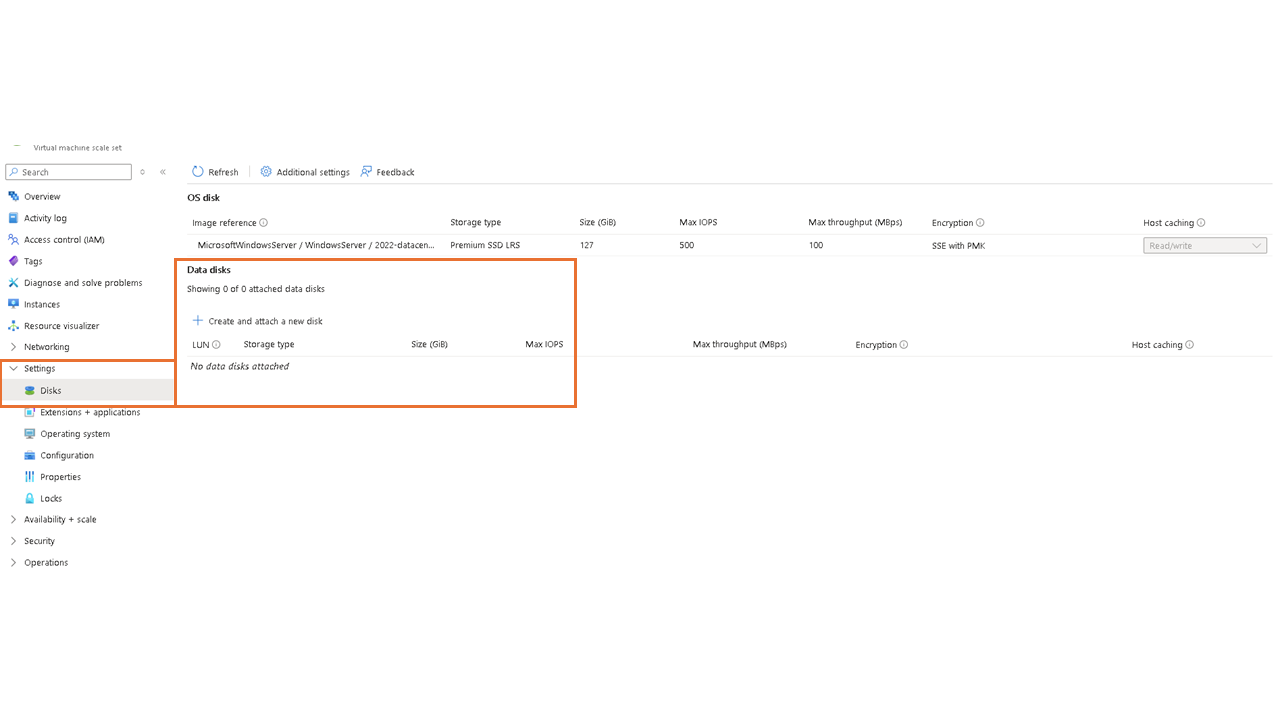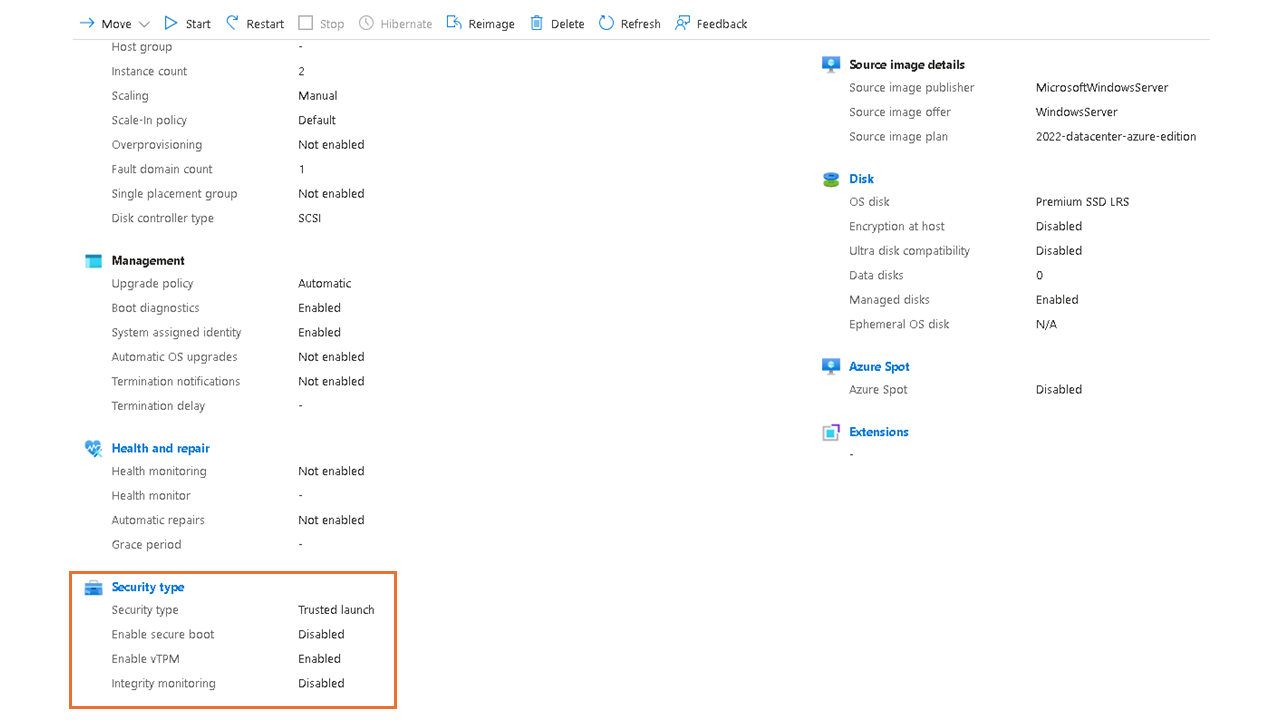(プレビュー) 既存の仮想マシン スケール セットでトラステッド起動を有効にする
適用対象: ✔️ Linux VM ✔️ Windows VM ✔️ Virtual Machine Scale Sets Uniform
Azure Virtual Machine Scale Sets は、トラステッド起動セキュリティ タイプへのアップグレードによる既存のユニフォーム スケール セット上のトラステッド起動の有効化をサポートしています。
トラステッド起動は、Azure 第 2 世代の仮想マシンとスケール セット上での基本的なコンピューティング セキュリティを実現し、それらをブート キットやルートキットなどの高度で永続的な攻撃手法から保護します。 これは、スケール セット上でセキュア ブート、vTPM、ブート整合性監視などのインフラストラクチャ テクノロジを組み合わせることによって実現されます。
制限事項
データ ディスクがアタッチされている既存の仮想マシン スケール セットでのトラステッド起動の有効化は現在サポートされていません。
- スケール セットがデータ ディスクで構成されているかどうかを検証するには、スケール セット -> [設定] メニューの [ディスク] に移動 -> [データ ディスク] 見出しの下を確認します

- スケール セットがデータ ディスクで構成されているかどうかを検証するには、スケール セット -> [設定] メニューの [ディスク] に移動 -> [データ ディスク] 見出しの下を確認します
既存の仮想マシン スケール セット Flex でのトラステッド起動の有効化は現在サポートされていません。
既存の Service Fabric クラスターおよび Service Fabric マネージド クラスターでのトラステッド起動の有効化は現在サポートされていません。
前提条件
- スケール セット サブスクリプション上の名前空間
Microsoft.Computeのプレビュー機能ImageSkuGenUpdateWithVMSSを登録します。 詳細については、「Azure サブスクリプションでのプレビュー機能の設定」を参照してください - スケール セットは、トラステッド起動で現在サポートされていない機能には依存していません。
- スケール セットは、トラステッド起動がサポートされているサイズ ファミリで構成する必要があります
Note
- 仮想マシンのサイズは、トラステッド起動のアップグレードに合わせて変更できます。 アップグレードの失敗を回避するために、新しい VM サイズ用のクォータが存在していることを確認します。 「vCPU クォータの確認」を参照してください。
- 仮想マシン サイズの変更では、新しいサイズの仮想マシン インスタンスが再作成されるので、個々の仮想マシン インスタンスのダウンタイムが必要になります。 これは、スケール セットのダウンタイムを回避するために、ローリング アップグレードの方法で実行できます。
- スケール セットは、トラステッド起動がサポートされている OS イメージで構成する必要があります。 Azure Compute Gallery OS イメージに関しては、イメージ定義が TrustedLaunchSupported としてマークされていることを確認します
既存のスケール セット ユニフォームでトラステッド起動を有効にする
このセクションでは、ARM テンプレートを使用して既存の仮想マシン スケール セット ユニフォームでトラステッド起動を有効にする手順について説明します。
既存の ARM テンプレート デプロイ コードに以下の変更を加えます。 完全なテンプレートについては、「クイックスタート トラステッド起動スケール セット ARM テンプレート」を参照してください。
重要
トラステッド起動セキュリティ タイプが利用できるのは、スケール セット apiVersion 2020-12-01 以上です。 アップグレード前に API バージョンが正しく設定されていることを確認します。
OS イメージ: OS イメージ参照を Gen2 トラステッド起動がサポートされている OS イメージに更新します。 Azure Compute Gallery OS イメージを使用している場合は、ソースの Gen2 イメージが
TrustedLaunchSupportedセキュリティ タイプを持っていることを確認します。"storageProfile": { "osDisk": { "createOption": "FromImage", "caching": "ReadWrite" }, "imageReference": { "publisher": "MicrosoftWindowsServer", "offer": "WindowsServer", "sku": "2022-datacenter-azure-edition", "version": "latest" } }(省略可能) スケール セット サイズ: 現在のサイズ ファミリがトラステッド起動セキュリティ構成でサポートされていない場合は、スケール セット サイズを変更します。
"sku": { "name": "Standard_D2s_v3", "tier": "Standard", "capacity": "[parameters('instanceCount')]" }セキュリティ プロファイル:
virtualMachineProfileの下にsecurityProfileブロックを追加して、トラステッド起動セキュリティ構成を有効にします。Note
推奨設定:
vTPM:trueおよびsecureBoot:trueOS 上で何らかの署名されていないカスタム ドライバーやカーネルを使用している場合は、secureBootをfalseに設定する必要があります。"securityProfile": { "securityType": "TrustedLaunch", "uefiSettings": { "secureBootEnabled": true, "vTpmEnabled": true } }(推奨) ゲスト構成証明拡張機能: スケール セット リソースにゲスト構成証明 (GA) 拡張機能を追加します。これにより、スケール セットのブート整合性監視が可能になります。
重要
ゲスト構成証明拡張機能では、
secureBootとvTPMがtrueに設定されている必要があります。{ "condition": "[and(parameters('vTPM'), parameters('secureBoot'))]", "type": "Microsoft.Compute/virtualMachineScaleSets/extensions", "apiVersion": "2022-03-01", "name": "[format('{0}/{1}', parameters('vmssName'), GuestAttestation)]", "location": "[parameters('location')]", "properties": { "publisher": "Microsoft.Azure.Security.WindowsAttestation", "type": "GuestAttestation", "typeHandlerVersion": "1.0", "autoUpgradeMinorVersion": true, "enableAutomaticUpgrade": true, "settings": { "AttestationConfig": { "MaaSettings": { "maaEndpoint": "[substring('emptystring', 0, 0)]", "maaTenantName": "GuestAttestation" } } } }, "dependsOn": [ "[resourceId('Microsoft.Compute/virtualMachineScaleSets', parameters('vmssName'))]" ] }拡張機能の発行元の名前:
OS の種類 拡張機能の発行元の名前 Windows Microsoft.Azure.Security.WindowsAttestation Linux Microsoft.Azure.Security.LinuxAttestation テンプレートに加えられた変更を確認します。
展開して、既存のスケール セットのトラステッド起動とロールバック (必要な場合) へのアップグレードをサポートする完全なサンプル ARM テンプレートを表示します。
{ "$schema": "https://schema.management.azure.com/schemas/2019-04-01/deploymentTemplate.json#", "contentVersion": "1.0.0.0", "parameters": { "vmSku": { "type": "string", "defaultValue": "Standard_D2s_v3", "metadata": { "description": "Size of VMs in the VM Scale Set." } }, "sku": { "type": "string", "defaultValue": "2022-datacenter-azure-edition", "allowedValues": [ "2022-datacenter-azure-edition" ], "metadata": { "description": "The Windows version for the VM. This will pick a fully patched image of this given Windows version." } }, "vmssName": { "type": "string", "maxLength": 61, "metadata": { "description": "String used as a base for naming resources. Must be 3-61 characters in length and globally unique across Azure. A hash is prepended to this string for some resources, and resource-specific information is appended." } }, "instanceCount": { "type": "int", "defaultValue": 2, "maxValue": 100, "minValue": 1, "metadata": { "description": "Number of VM instances (100 or less)." } }, "adminUsername": { "type": "string", "metadata": { "description": "Admin username on all VMs." } }, "adminPassword": { "type": "securestring", "metadata": { "description": "Admin password on all VMs." } }, "location": { "type": "string", "defaultValue": "[resourceGroup().location]", "metadata": { "description": "Location for all resources." } }, "publicIpName": { "type": "string", "defaultValue": "myPublicIP", "metadata": { "description": "Name for the Public IP used to access the virtual machine Scale set." } }, "publicIPAllocationMethod": { "type": "string", "defaultValue": "Static", "allowedValues": [ "Dynamic", "Static" ], "metadata": { "description": "Allocation method for the Public IP used to access the virtual machine set." } }, "publicIpSku": { "type": "string", "defaultValue": "Standard", "allowedValues": [ "Basic", "Standard" ], "metadata": { "description": "SKU for the Public IP used to access the virtual machine Scale set." } }, "dnsLabelPrefix": { "type": "string", "defaultValue": "[toLower(format('{0}-{1}', parameters('vmssName'), uniqueString(resourceGroup().id)))]", "metadata": { "description": "Unique DNS Name for the Public IP used to access the virtual machine Scale set." } }, "healthExtensionProtocol": { "type": "string", "defaultValue": "TCP", "allowedValues": [ "TCP", "HTTP", "HTTPS" ] }, "healthExtensionPort": { "type": "int", "defaultValue": 3389 }, "healthExtensionRequestPath": { "type": "string", "defaultValue": "/" }, "overprovision": { "type": "bool", "defaultValue": false }, "upgradePolicy": { "type": "string", "defaultValue": "Manual", "allowedValues": [ "Manual", "Rolling", "Automatic" ] }, "maxBatchInstancePercent": { "type": "int", "defaultValue": 20 }, "maxUnhealthyInstancePercent": { "type": "int", "defaultValue": 20 }, "maxUnhealthyUpgradedInstancePercent": { "type": "int", "defaultValue": 20 }, "pauseTimeBetweenBatches": { "type": "string", "defaultValue": "PT5S" }, "securityType": { "type": "string", "defaultValue": "TrustedLaunch", "allowedValues": [ "Standard", "TrustedLaunch" ], "metadata": { "description": "Security Type of the Virtual Machine." } }, "encryptionAtHost": { "type": "bool", "defaultValue": false, "metadata": { "description": "This property can be used by user in the request to enable or disable the Host Encryption for the virtual machine or virtual machine Scale set. This will enable the encryption for all the disks including Resource/Temp disk at host itself. The default behavior is: The Encryption at host will be disabled unless this property is set to true for the resource." } } }, "variables": { "namingInfix": "[toLower(substring(format('{0}{1}', parameters('vmssName'), uniqueString(resourceGroup().id)), 0, 9))]", "addressPrefix": "10.0.0.0/16", "subnetPrefix": "10.0.0.0/24", "virtualNetworkName": "[format('{0}vnet', variables('namingInfix'))]", "subnetName": "[format('{0}subnet', variables('namingInfix'))]", "loadBalancerName": "[format('{0}lb', variables('namingInfix'))]", "natPoolName": "[format('{0}natpool', variables('namingInfix'))]", "bePoolName": "[format('{0}bepool', variables('namingInfix'))]", "natStartPort": 50000, "natEndPort": 50119, "natBackendPort": 3389, "nicName": "[format('{0}nic', variables('namingInfix'))]", "ipConfigName": "[format('{0}ipconfig', variables('namingInfix'))]", "imageReference": { "2022-datacenter-azure-edition": { "publisher": "MicrosoftWindowsServer", "offer": "WindowsServer", "sku": "[parameters('sku')]", "version": "latest" } }, "extensionName": "GuestAttestation", "extensionPublisher": "Microsoft.Azure.Security.WindowsAttestation", "extensionVersion": "1.0", "maaTenantName": "GuestAttestation", "maaEndpoint": "[substring('emptyString', 0, 0)]", "uefiSettingsJson": { "secureBootEnabled": true, "vTpmEnabled": true }, "rollingUpgradeJson": { "maxBatchInstancePercent": "[parameters('maxBatchInstancePercent')]", "maxUnhealthyInstancePercent": "[parameters('maxUnhealthyInstancePercent')]", "maxUnhealthyUpgradedInstancePercent": "[parameters('maxUnhealthyUpgradedInstancePercent')]", "pauseTimeBetweenBatches": "[parameters('pauseTimeBetweenBatches')]" } }, "resources": [ { "type": "Microsoft.Network/virtualNetworks", "apiVersion": "2022-05-01", "name": "[variables('virtualNetworkName')]", "location": "[parameters('location')]", "properties": { "addressSpace": { "addressPrefixes": [ "[variables('addressPrefix')]" ] }, "subnets": [ { "name": "[variables('subnetName')]", "properties": { "addressPrefix": "[variables('subnetPrefix')]" } } ] } }, { "type": "Microsoft.Network/publicIPAddresses", "apiVersion": "2022-05-01", "name": "[parameters('publicIpName')]", "location": "[parameters('location')]", "sku": { "name": "[parameters('publicIpSku')]" }, "properties": { "publicIPAllocationMethod": "[parameters('publicIPAllocationMethod')]", "dnsSettings": { "domainNameLabel": "[parameters('dnsLabelPrefix')]" } } }, { "type": "Microsoft.Network/loadBalancers", "apiVersion": "2022-05-01", "name": "[variables('loadBalancerName')]", "location": "[parameters('location')]", "sku": { "name": "[parameters('publicIpSku')]", "tier": "Regional" }, "properties": { "frontendIPConfigurations": [ { "name": "LoadBalancerFrontEnd", "properties": { "publicIPAddress": { "id": "[resourceId('Microsoft.Network/publicIPAddresses', parameters('publicIpName'))]" } } } ], "backendAddressPools": [ { "name": "[variables('bePoolName')]" } ], "inboundNatPools": [ { "name": "[variables('natPoolName')]", "properties": { "frontendIPConfiguration": { "id": "[resourceId('Microsoft.Network/loadBalancers/frontendIPConfigurations', variables('loadBalancerName'), 'loadBalancerFrontEnd')]" }, "protocol": "Tcp", "frontendPortRangeStart": "[variables('natStartPort')]", "frontendPortRangeEnd": "[variables('natEndPort')]", "backendPort": "[variables('natBackendPort')]" } } ] }, "dependsOn": [ "[resourceId('Microsoft.Network/publicIPAddresses', parameters('publicIpName'))]" ] }, { "type": "Microsoft.Compute/virtualMachineScaleSets", "apiVersion": "2022-03-01", "name": "[parameters('vmssName')]", "location": "[parameters('location')]", "sku": { "name": "[parameters('vmSku')]", "tier": "Standard", "capacity": "[parameters('instanceCount')]" }, "properties": { "virtualMachineProfile": { "storageProfile": { "osDisk": { "createOption": "FromImage", "caching": "ReadWrite" }, "imageReference": "[variables('imageReference')[parameters('sku')]]" }, "osProfile": { "computerNamePrefix": "[variables('namingInfix')]", "adminUsername": "[parameters('adminUsername')]", "adminPassword": "[parameters('adminPassword')]" }, "securityProfile": { "encryptionAtHost": "[parameters('encryptionAtHost')]", "securityType": "[parameters('securityType')]", "uefiSettings": "[if(equals(parameters('securityType'), 'TrustedLaunch'), variables('uefiSettingsJson'), null())]" }, "networkProfile": { "networkInterfaceConfigurations": [ { "name": "[variables('nicName')]", "properties": { "primary": true, "ipConfigurations": [ { "name": "[variables('ipConfigName')]", "properties": { "subnet": { "id": "[resourceId('Microsoft.Network/virtualNetworks/subnets', variables('virtualNetworkName'), variables('subnetName'))]" }, "loadBalancerBackendAddressPools": [ { "id": "[resourceId('Microsoft.Network/loadBalancers/backendAddressPools', variables('loadBalancerName'), variables('bePoolName'))]" } ], "loadBalancerInboundNatPools": [ { "id": "[resourceId('Microsoft.Network/loadBalancers/inboundNatPools', variables('loadBalancerName'), variables('natPoolName'))]" } ] } } ] } } ] }, "extensionProfile": { "extensions": [ { "name": "HealthExtension", "properties": { "publisher": "Microsoft.ManagedServices", "type": "ApplicationHealthWindows", "typeHandlerVersion": "1.0", "autoUpgradeMinorVersion": false, "settings": { "protocol": "[parameters('healthExtensionProtocol')]", "port": "[parameters('healthExtensionPort')]", "requestPath": "[if(equals(parameters('healthExtensionProtocol'), 'TCP'), null(), parameters('healthExtensionRequestPath'))]" } } } ] }, "diagnosticsProfile": { "bootDiagnostics": { "enabled": true } } }, "orchestrationMode": "Uniform", "overprovision": "[parameters('overprovision')]", "upgradePolicy": { "mode": "[parameters('upgradePolicy')]", "rollingUpgradePolicy": "[if(equals(parameters('upgradePolicy'), 'Rolling'), variables('rollingUpgradeJson'), null())]", "automaticOSUpgradePolicy": { "enableAutomaticOSUpgrade": true } } }, "dependsOn": [ "[resourceId('Microsoft.Network/loadBalancers', variables('loadBalancerName'))]", "[resourceId('Microsoft.Network/virtualNetworks', variables('virtualNetworkName'))]" ] }, { "condition": "[and(equals(parameters('securityType'), 'TrustedLaunch'), and(equals(variables('uefiSettingsJson').secureBootEnabled, true()), equals(variables('uefiSettingsJson').vTpmEnabled, true())))]", "type": "Microsoft.Compute/virtualMachineScaleSets/extensions", "apiVersion": "2022-03-01", "name": "[format('{0}/{1}', parameters('vmssName'), variables('extensionName'))]", "location": "[parameters('location')]", "properties": { "publisher": "[variables('extensionPublisher')]", "type": "[variables('extensionName')]", "typeHandlerVersion": "[variables('extensionVersion')]", "autoUpgradeMinorVersion": true, "enableAutomaticUpgrade": true, "settings": { "AttestationConfig": { "MaaSettings": { "maaEndpoint": "[variables('maaEndpoint')]", "maaTenantName": "[variables('maaTenantName')]" } } } }, "dependsOn": [ "[resourceId('Microsoft.Compute/virtualMachineScaleSets', parameters('vmssName'))]" ] } ] }ARM テンプレートのデプロイを実行します。
$resourceGroupName = "myResourceGroup" $parameterFile = "folderPathToFile\parameters.json" $templateFile = "folderPathToFile\template.json" New-AzResourceGroupDeployment ` -ResourceGroupName $resourceGroupName ` -TemplateFile $templateFile -TemplateParameterFile $parameterFileデプロイが成功したことを確認します。 Azure portal を使用して、スケール セット ユニフォームのセキュリティ タイプと UEFI 設定を確認します。 概要ページの [セキュリティの種類] セクションを確認します。

スケール セット ユニフォームのアップグレード モードが
Manualに設定されている場合は、VM インスタンスを手動で更新します。$resourceGroupName = "myResourceGroup" $vmssName = "VMScaleSet001" Update-AzVmssInstance -ResourceGroupName $resourceGroupName -VMScaleSetName $vmssName -InstanceId "0"
ロールバック
トラステッド起動から以前の正常な構成へと変更をロールバックするには、スケール セットの securityType を Standard に設定する必要があります。
トラステッド起動から以前の正常な構成へと変更をロールバックするには、以下に示すように securityProfile を Standard に設定します。 必要に応じて、他のパラメーターの変更 (OS イメージ、VM サイズ) を元に戻し、「既存のスケール セットでトラステッド起動を有効にする」で説明されている手順 5 から 8 を繰り返すこともできます
"securityProfile": {
"securityType": "Standard",
"uefiSettings": "[null()]"
}
次のステップ
(推奨) アップグレード後に、ブートの整合性の監視を有効にして、Microsoft Defender for Cloud を使って VM の正常性を監視できます。